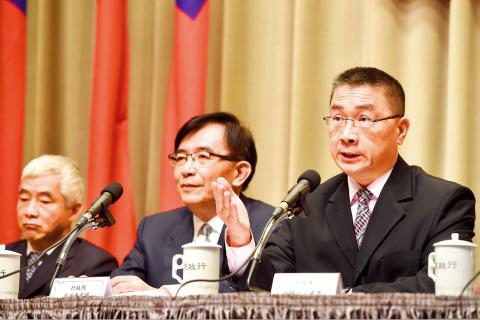The Forward-looking Infrastructure Development Program draft bill review should be held again, the legislature’s Economics Committee convenor said yesterday, adding that there were flaws in her chairing of Wednesday’s review, which passed the bill amid chaos.
The convenor, Democratic Progressive Party (DPP) Legislator Chiu Yi-ying (邱議瑩), said she would reschedule the review for Monday, Wednesday and Thursday next week to allow for detailed, clause-by-clause deliberation.
“I am willing to take responsibility and rearrange the review. Can lawmakers of the opposition party give up hatred, restart conversations, keep their promise to not disrupt the procedure and make efforts to improve the nation’s infrastructure?” Chiu asked, calling on the Chinese Nationalist Party (KMT) not to boycott the draft bill.

Photo: Peter Lo, Taipei Times
She said the DPP did not boycott a four-year NT$500 billion (US$16.6 billion) economic stimulus project proposed by then-president Ma Ying-jeou (馬英九) in 2008, which allowed the project to be approved within a month.
KMT caucus convener Sufin Siluko (廖國棟) said the new review is “acceptable, as it is precisely our call,” but demanded a formal decision be announced by the legislative speaker or by a cross-caucus meeting, rather than on Facebook.
The New Power Party caucus yesterday morning had already asked Legislative Speaker Su Jia-chyuan (蘇嘉全) to call a cross-caucus negotiation meeting and restart substantive review, and later said it “welcomes” the DPP caucus’ decision.
Su said Chiu’s proposal is “highly commendable” and he expects there would be no boycott or physical altercations during the new review.
Premier Lin Chuan (林全) sought to assuage concerns and drum up support for the infrastructure plan, calling on all parties to put aside preconceived ideas and treat the program in a practical and reasonable manner.
No part of the plan is to be implemented until environmental impact assessments have been carried out, Lin said in response to concerns expressed by environmental groups over some of the proposed transportation projects.
There would also be no major relocation of people or land requisitions, he added.
He made the comments when speaking at a weekly Cabinet meeting, Executive Yuan spokesman Hsu Kuo-yung (徐國勇) said.
Lin addressed these criticisms a day after President Tsai Ing-wen (蔡英文) said the Cabinet was not doing enough to help the public understand the plan.
Lawmakers of the ruling and opposition parties on Wednesday pushed and shoved each other during a joint committee session before the bill passed its preliminary review.
The statute would allow the Cabinet to spend NT$882.49 billion over eight years to build infrastructure projects across the nation, including new light railways and several rail extension or improvement projects.
There will be no question of leaving future generations in debt as a result of the plan, Lin said.
When announcing the plan last month, Lin said that government spending is expected to lead to NT$1.77 trillion in private-sector investment and add 0.7 percent to the nation’s GDP growth each year over the eight-year period.

The manufacture of the remaining 28 M1A2T Abrams tanks Taiwan purchased from the US has recently been completed, and they are expected to be delivered within the next one to two months, a source said yesterday. The Ministry of National Defense is arranging cargo ships to transport the tanks to Taiwan as soon as possible, said the source, who is familiar with the matter. The estimated arrival time ranges from late this month to early next month, the source said. The 28 Abrams tanks make up the third and final batch of a total of 108 tanks, valued at about NT$40.5 billion

A group from the Taiwanese Designers in Australia association yesterday represented Taiwan at the Midsumma Pride March in Melbourne. The march, held in the St. Kilda suburb, is the city’s largest LGBTQIA+ parade and the flagship event of the annual Midsumma Festival. It attracted more than 45,000 spectators who supported the 400 groups and 10,000 marchers that participated this year, the association said. Taiwanese Designers said they organized a team to march for Taiwan this year, joining politicians, government agencies, professionals and community organizations in showing support for LGBTQIA+ people and diverse communities. As the first country in Asia to legalize same-sex

MOTIVES QUESTIONED The PLA considers Xi’s policies toward Taiwan to be driven by personal considerations rather than military assessment, the Epoch Times reports Chinese President Xi Jinping’s (習近平) latest purge of the Chinese People’s Liberation Army (PLA) leadership might have been prompted by the military’s opposition to plans of invading Taiwan, the Epoch Times said. The Chinese military opposes waging war against Taiwan by a large consensus, putting it at odds with Xi’s vision, the Falun Gong-affiliated daily said in a report on Thursday, citing anonymous sources with insight into the PLA’s inner workings. The opposition is not the opinion of a few generals, but a widely shared view among the PLA cadre, the Epoch Times cited them as saying. “Chinese forces know full well that

Travel agencies in Taiwan are working to secure alternative flights for travelers bound for New Zealand for the Lunar New Year holiday, as Air New Zealand workers are set to strike next week. The airline said that it has confirmed that the planned industrial action by its international wide-body cabin crew would go ahead on Thursday and Friday next week. While the Auckland-based carrier pledged to take reasonable measures to mitigate the impact of the workers’ strike, an Air New Zealand flight arriving at Taipei from Auckland on Thursday and another flight departing from Taipei for Auckland on Saturday would have to